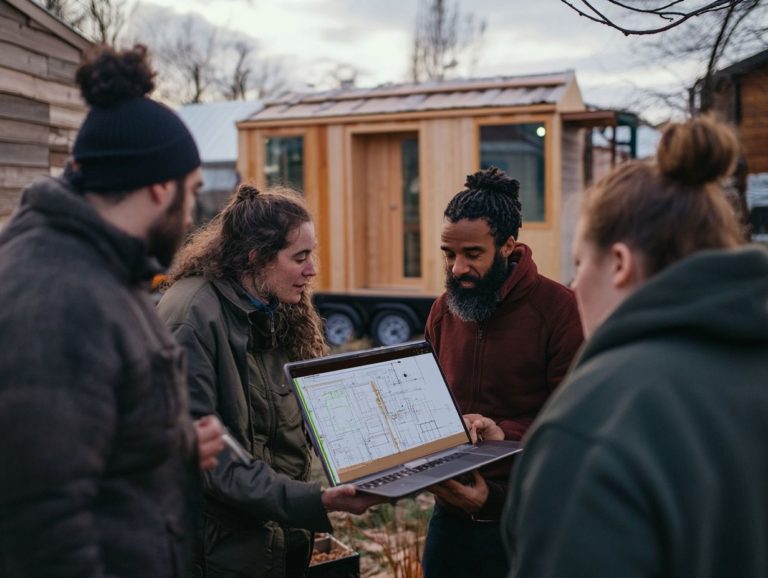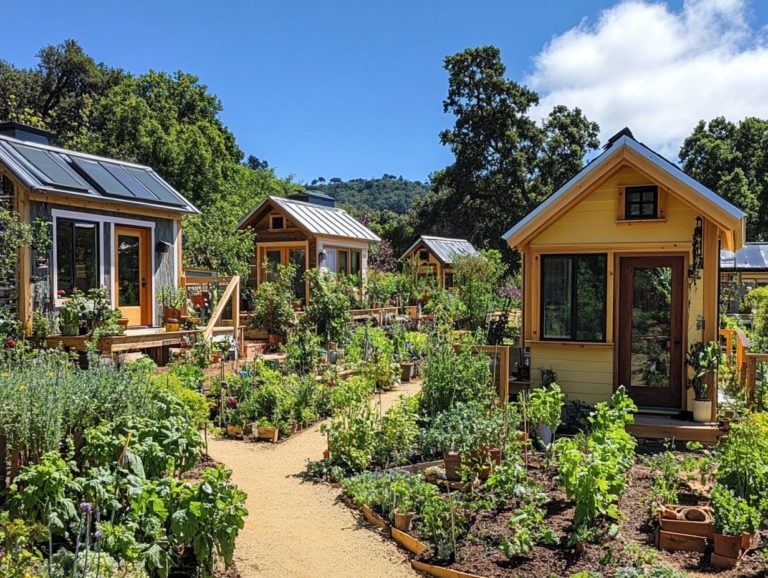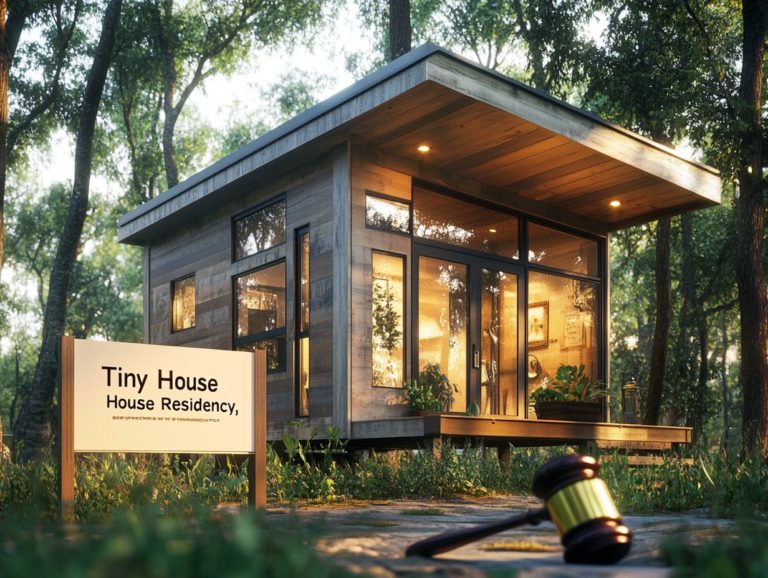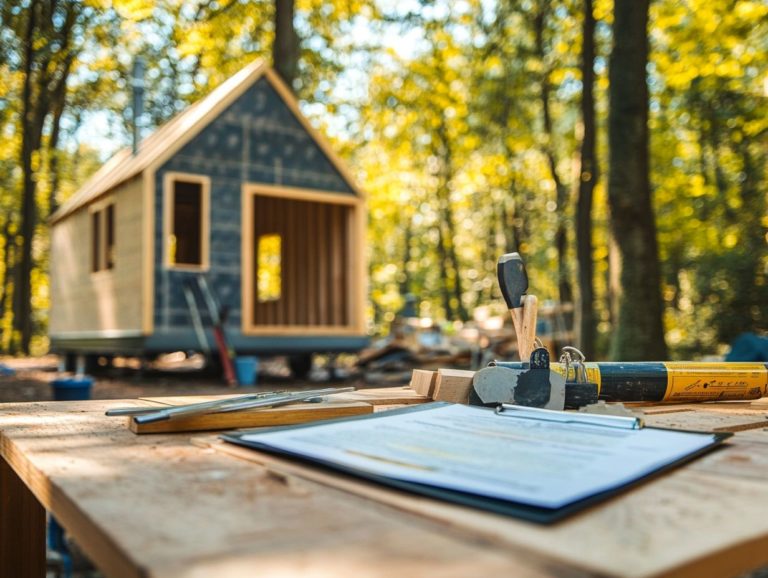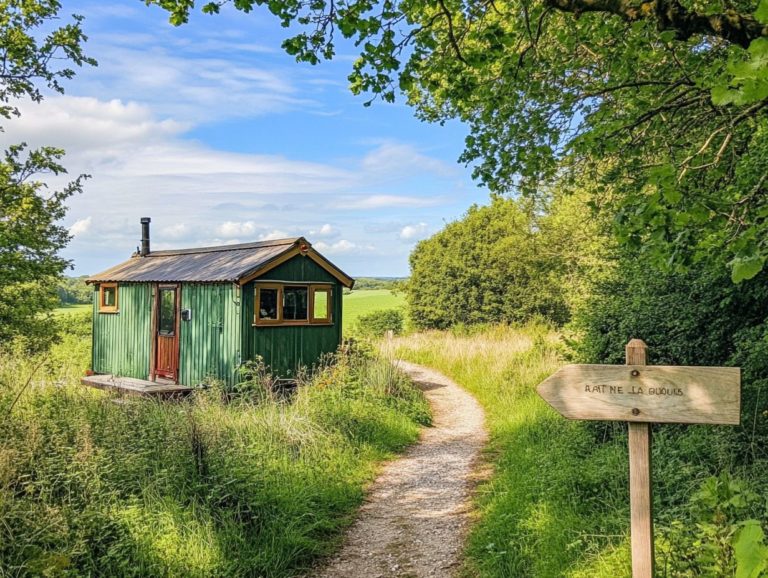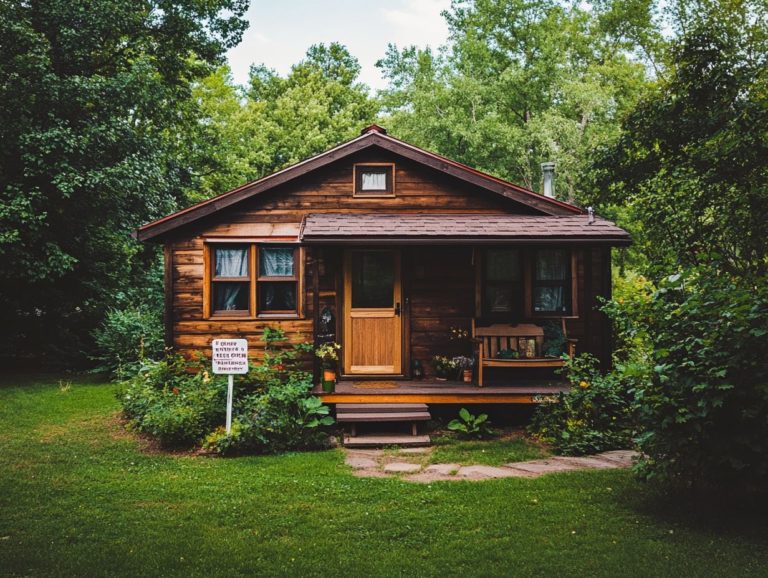Tiny House Laws: What Every Owner Should Know
Tiny houses are a popular choice for those living simply. They also appeal to people seeking a sustainable lifestyle.
However, the journey to tiny house ownership presents challenges, especially when navigating the complexities of zoning laws, building codes, and permits.
This guide reveals everything you need to navigate tiny house regulations with confidence! It covers crucial topics, from grasping zoning laws to ensuring compliance with building codes, and even delves into legal considerations like insurance and community relations.
Whether you re already enjoying life in a tiny house or contemplating the transition, this resource will equip you with a clear understanding of the legal landscape associated with tiny house living.
Contents [hide]
- Key Takeaways:
- Understanding Zoning Laws
- Building Codes and Regulations
- Permits and Inspections
- Legal Considerations for Tiny House Owners
- Frequently Asked Questions
- What are the main laws that every owner of a tiny house should know?
- What is a zoning law and how does it affect tiny house owners?
- Do tiny houses have to adhere to building codes?
- Are there any minimum size requirements for a tiny house to be considered a legal dwelling?
- Can I park my tiny house on any property?
- Are there any special permits or licenses required for owning a tiny house?
Key Takeaways:
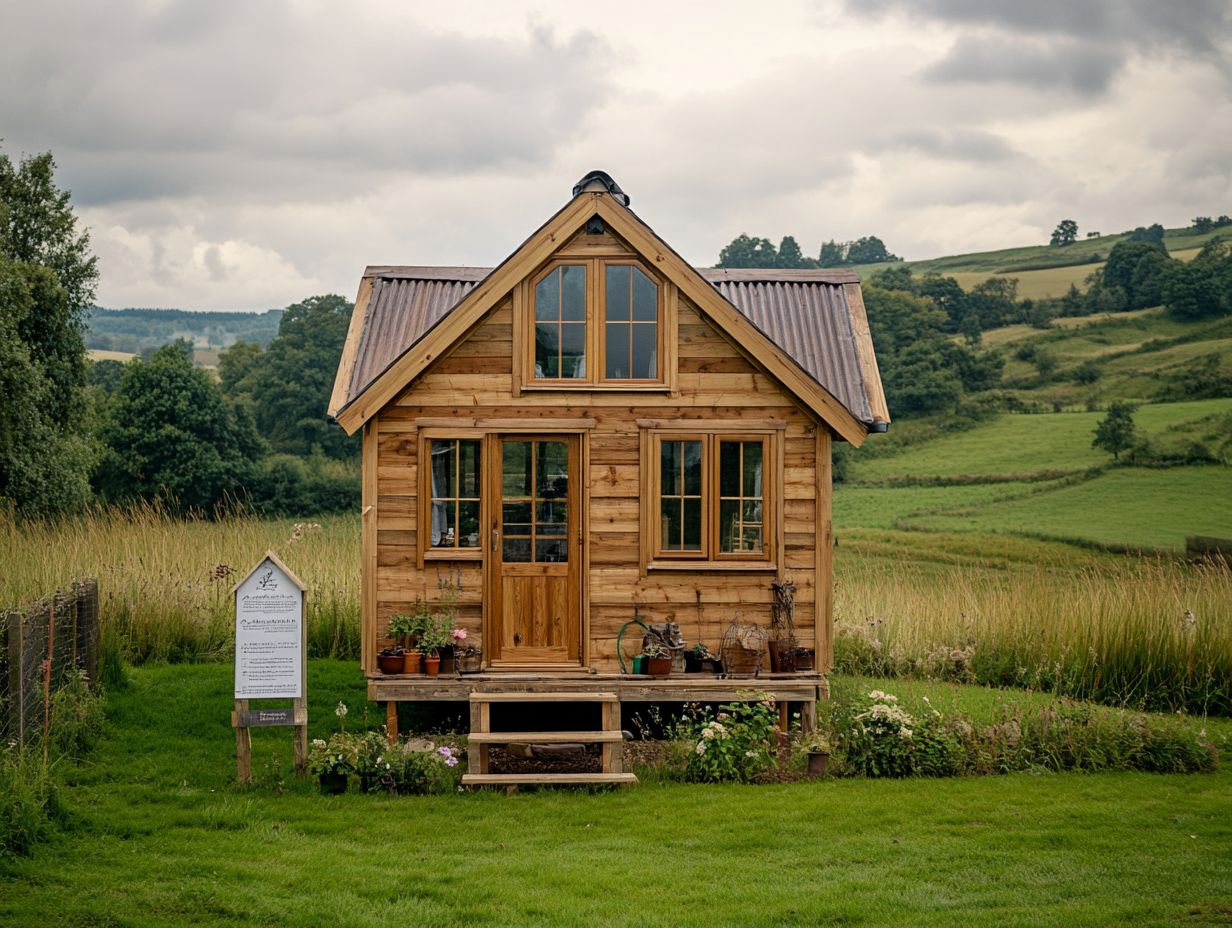
- Understanding local zoning laws is crucial for tiny house owners to avoid legal issues and fines.
- Complying with building codes and obtaining necessary permits and inspections is necessary for the safety and legality of a tiny house.
- Tiny house owners should consider insurance, taxes, and community relationships to ensure a smooth and successful living experience.
What are Tiny Houses?
Tiny houses, marked by their minimalistic design and efficient use of space, embody a trend called the Tiny House Movement. These compact homes, typically under 400 square feet, invite you to embrace a lifestyle centered on simplicity, affordability, and environmental consciousness. If you’re considering downsizing and pursuing a more sustainable way of life, tiny houses offer a unique pathway.
Whether built on foundations or wheels, they provide diverse features that cater to various needs, making them an intriguing option in today s housing market.
At the heart of tiny house living lies a philosophy that champions experiences over possessions, allowing you to feel freer and develop a deeper connection to your environment. Builders of tiny houses often employ innovative construction styles that maximize functionality while utilizing sustainable and environmentally friendly materials.
From mobile tiny homes perfect for those who prioritize mobility to stationary options that blend seamlessly into picturesque landscapes, there s a tiny house to suit every taste and lifestyle. For anyone seeking alternatives to traditional housing, the tiny homes for sale exemplify this evolving approach to living, encouraging a mindful existence in harmony with nature.
Understanding Zoning Laws
Understanding zoning laws is essential for anyone contemplating tiny house living, as these regulations determine the placement and construction of tiny homes across different jurisdictions. Zoning laws can vary significantly from one area to another, impacting aspects such as minimum square footage, land use, and the legality of tiny house construction.
Some areas are ‘tiny house friendly,’ which may offer more opportunities to establish your tiny home. Therefore, looking into local zoning regulations is crucial before you embark on this minimalist journey.
How Zoning Laws Affect Tiny House Living
Zoning laws play a crucial role in shaping your tiny house living experience by establishing the legal parameters for where these charming homes can thrive. For instance, you might discover that some areas impose minimum square footage requirements or only allow tiny houses as Accessory Dwelling Units (ADUs), which are small homes on larger properties. These regulations can pose significant hurdles for those aspiring to embrace tiny house living. It is imperative to grasp how zoning laws pertain to your specific locale, whether you re in Burleigh County, New York, or Sarasota County, Florida.
Understanding the intricacies of zoning laws is essential, particularly when it comes to tiny homes on wheels. These homes often contend with unique challenges, such as adhering to vehicle regulations instead of traditional housing codes. For more insights, explore tiny house living: the importance of zoning.
Navigating these regulations can mean rolling up your sleeves and engaging with local communities and planning boards to push for changes that make tiny living easier. Actively participating in local meetings and forging relationships with policymakers can open doors for modifications to existing laws. For a deeper understanding, consider exploring understanding tiny house land use laws. Ultimately, this grassroots approach empowers you and paves the way for tiny homes to be embraced everywhere!
This approach not only supports individual aspirations but also lays the groundwork for broader acceptance and integration of tiny homes into various neighborhoods.
Building Codes and Regulations
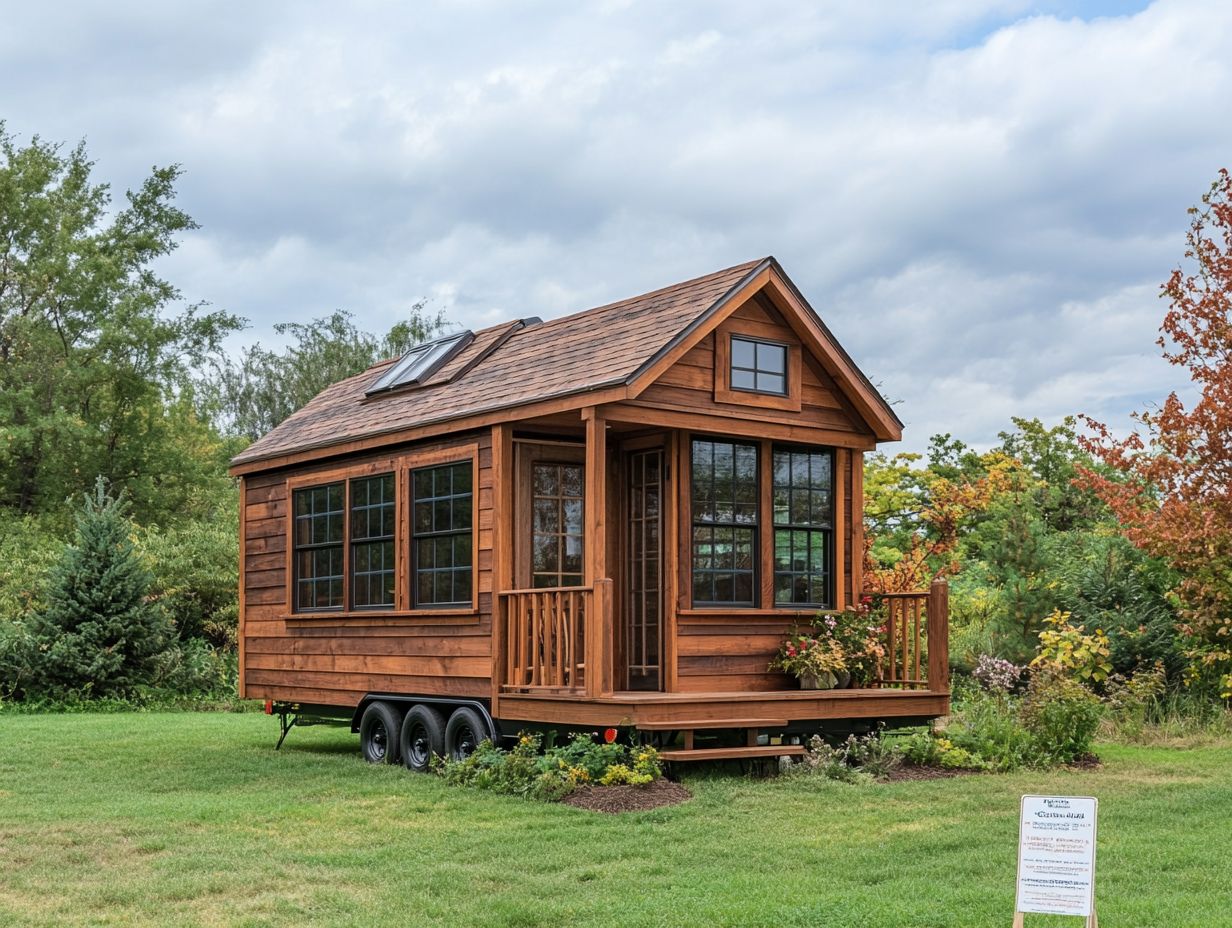
Building codes and regulations are essential in tiny house construction. They ensure that these compact dwellings adhere to safety standards and legal requirements. These codes can vary significantly from one state to another and even between municipalities. They influence everything from the materials used to the design specifications and plumbing installations.
For instance, California’s Title 25 lays out specific regulations for tiny homes. Different states like Georgia and Alabama may have their own unique standards. It’s crucial for builders and owners to stay well-informed about local building codes and to consult resources like tiny house regulations: a state-by-state guide when embarking on their tiny home project.
Complying with Building Codes
Complying with building codes is essential for you as a tiny house owner. This ensures your home meets safety and legal standards, safeguarding your investment and ensuring livability. It s crucial to understand the specific requirements for your area. These can dictate everything from your tiny house’s structural integrity to necessary features like fire safety measures and proper insulation.
For example, in places like Idaho and Hawaii, building codes may have unique stipulations that require your careful attention. Consulting local regulations is imperative.
This comprehensive approach begins with thorough research. Understanding local codes can often feel complex and daunting. You may frequently encounter challenges such as zoning restrictions, minimum square footage requirements, and compliance with unique regulations regarding utilities or mobile structures. Addressing these obstacles requires proactive planning. This might include discussing your designs with local officials and possibly enlisting the help of a professional architect who has experience with tiny houses. Additionally, familiarizing yourself with tiny house legal resources can be invaluable in navigating this process.
By tackling these issues head-on, you can seamlessly integrate essential features like eco-friendly materials or efficient layouts. This ultimately enhances both the functionality and charm of your compact living space.
Permits and Inspections
Securing the necessary permits and undergoing inspections are essential steps in your tiny house construction journey. These steps ensure your home aligns with local regulations and safety standards.
Depending on where you are, this might require obtaining building, electrical, and plumbing permits. You may also need to schedule inspections at different stages of the construction process.
As a tiny house builder or owner, it s crucial to navigate these legal requirements with care. Don t overlook these requirements, or you risk costly fines or potentially jeopardizing your ability to legally reside in your tiny home.
What Permits are Required?
Know what you need to kickstart your tiny house dream! The permits you’ll require for constructing a tiny house can vary significantly depending on local zoning regulations and building codes. It’s essential to understand what you need before diving into your project.
Beyond just building and zoning permits, many areas also mandate electrical, plumbing, and mechanical permits to ensure that all systems meet safety standards. Some states have specific regulations distinguishing between raw land and established properties, which could affect your plans. It s wise to explore local government websites or consult with officials to obtain accurate, location-specific information.
Grasping these nuances ensures your compliance and sets the stage for a smoother building process, helping you sidestep potential fines or complications later on.
Inspection Process for Tiny Houses
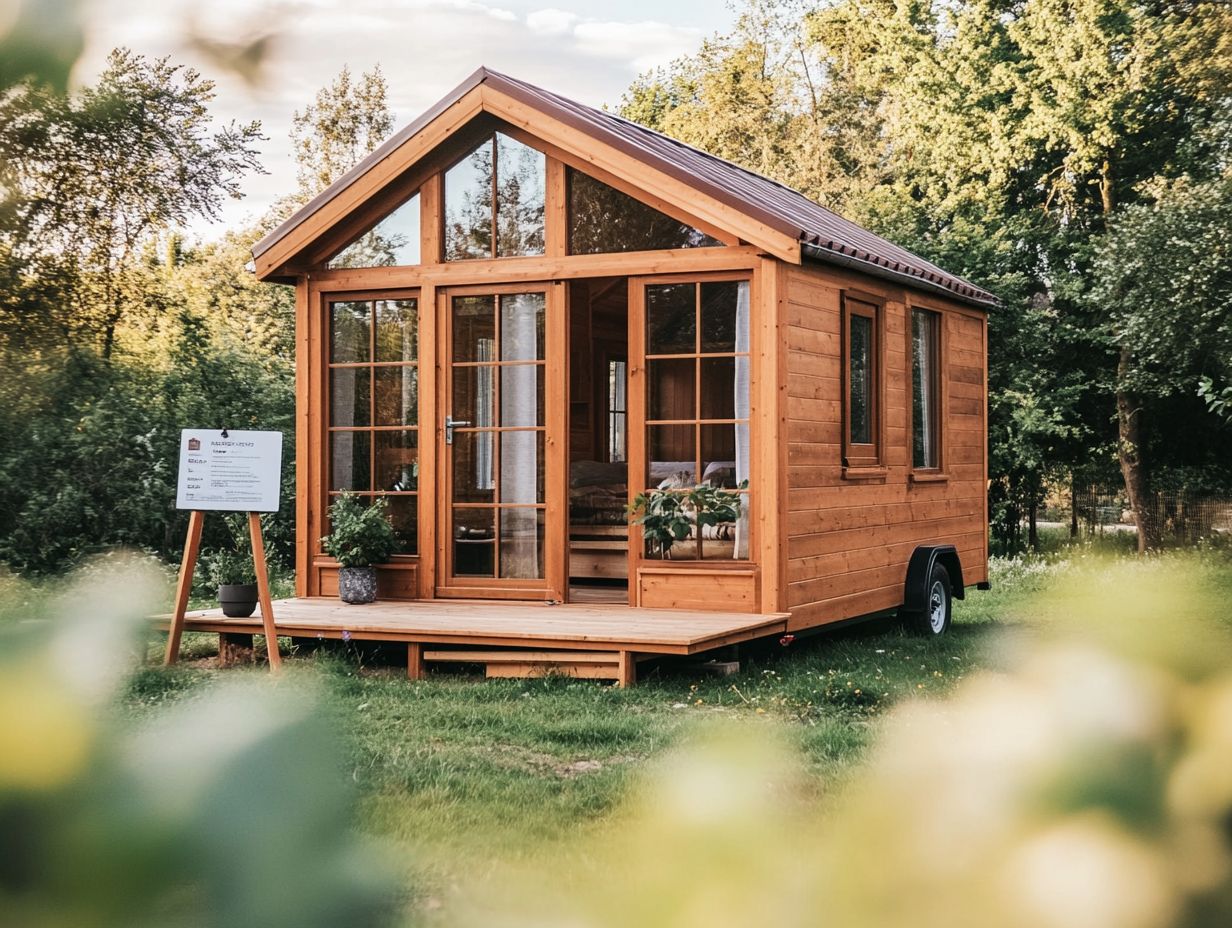
The inspection process for tiny houses is an essential step that guarantees compliance with building codes and local regulations, safeguarding the integrity of your construction. Authorities will scrutinize various elements of your tiny house, including its structural soundness, electrical systems, plumbing, and adherence to safety standards.
Depending on local laws, you may need to undergo multiple inspections at different stages of construction. Being prepared and informed about what to expect is crucial for you as a builder or owner.
Being thoroughly prepared for these inspections can significantly influence the outcome. Maintaining a checklist of required documents and proactively addressing potential issues will streamline the process and minimize delays.
Familiarize yourself with the specific requirements of each inspection phase, which often includes:
- Foundation inspections
- Framing checks
- Final inspections
Engaging experienced professionals, from contractors to inspectors, can provide you with invaluable insights into compliance best practices. Ultimately, adhering to regulations not only ensures safety but also enhances the overall value and durability of your tiny house.
Legal Considerations for Tiny House Owners
Understanding the laws is vital for tiny house owners, as it involves several important aspects, including insurance, taxes, and community regulations. You need to understand the implications of living in a tiny house, particularly regarding property taxes, which can vary considerably compared to traditional homes especially in regions where tiny houses are classified as accessory dwelling units (ADUs), which are secondary homes on a property.
You should secure suitable insurance coverage specifically designed for tiny house living to safeguard against potential liabilities and unexpected events. Additionally, understanding tiny house zoning laws becomes an integral part of embracing the tiny house lifestyle.
Insurance and Taxes
Don’t overlook your insurance and tax responsibilities; they re vital for your tiny house success! Understanding these responsibilities significantly affects your financial stability and legal standing. Unique challenges regarding property taxes may arise, especially if your home is on wheels or classified as an accessory dwelling unit (ADU). This classification can influence how your taxes are assessed and paid.
Securing appropriate insurance coverage tailored to tiny home living is essential. Standard homeowner policies often fall short in addressing the unique aspects of a tiny house. Many tiny house owners find that specialized insurance policies designed specifically for their needs are crucial. Additionally, understanding tiny house occupancy permits can help ensure compliance with local regulations. These policies offer coverage that accounts for the mobile nature and smaller size of these dwellings, including options like liability insurance, personal property coverage, and even policies that cater to custom-built features.
Regarding taxation, recognize that homes on wheels may be considered vehicles. This distinction leads to different tax implications compared to houses permanently affixed to a foundation. Understanding this can significantly influence how you handle your annual tax obligations and shape your overall financial planning. Additionally, being aware of tiny house legal challenges can help you navigate these complexities more effectively.
Getting Along with Neighbors and Community
Navigating relationships with neighbors is crucial in tiny house living. The dynamics of your surroundings can greatly influence your experience. Keeping open communication and transparency with those nearby can help alleviate any concerns about property use, zoning laws, and the intricacies of tiny home life.
This helps everyone live happily together.
Participating in local tiny house communities helps you gain invaluable support and resources. This enhances your understanding of the legal implications and social dynamics of this lifestyle. For those navigating legal aspects, seeking tiny house legal assistance can be beneficial. Embracing open dialogue cultivates trust, minimizing misunderstandings and resistance.
Organizing community events or casual meet-ups can further solidify these connections. This fosters a shared sense of belonging and creates a robust support network, guiding you through the unique challenges of tiny living.
Such interactions can spark collaboration on community projects and advocate for zoning policies that better accommodate tiny houses, enriching the overall neighborhood spirit. To ensure compliance, it’s important to understand tiny house licensing. These strategies help you thrive in your micro-community, transforming tiny house living into a truly rewarding experience.
Frequently Asked Questions
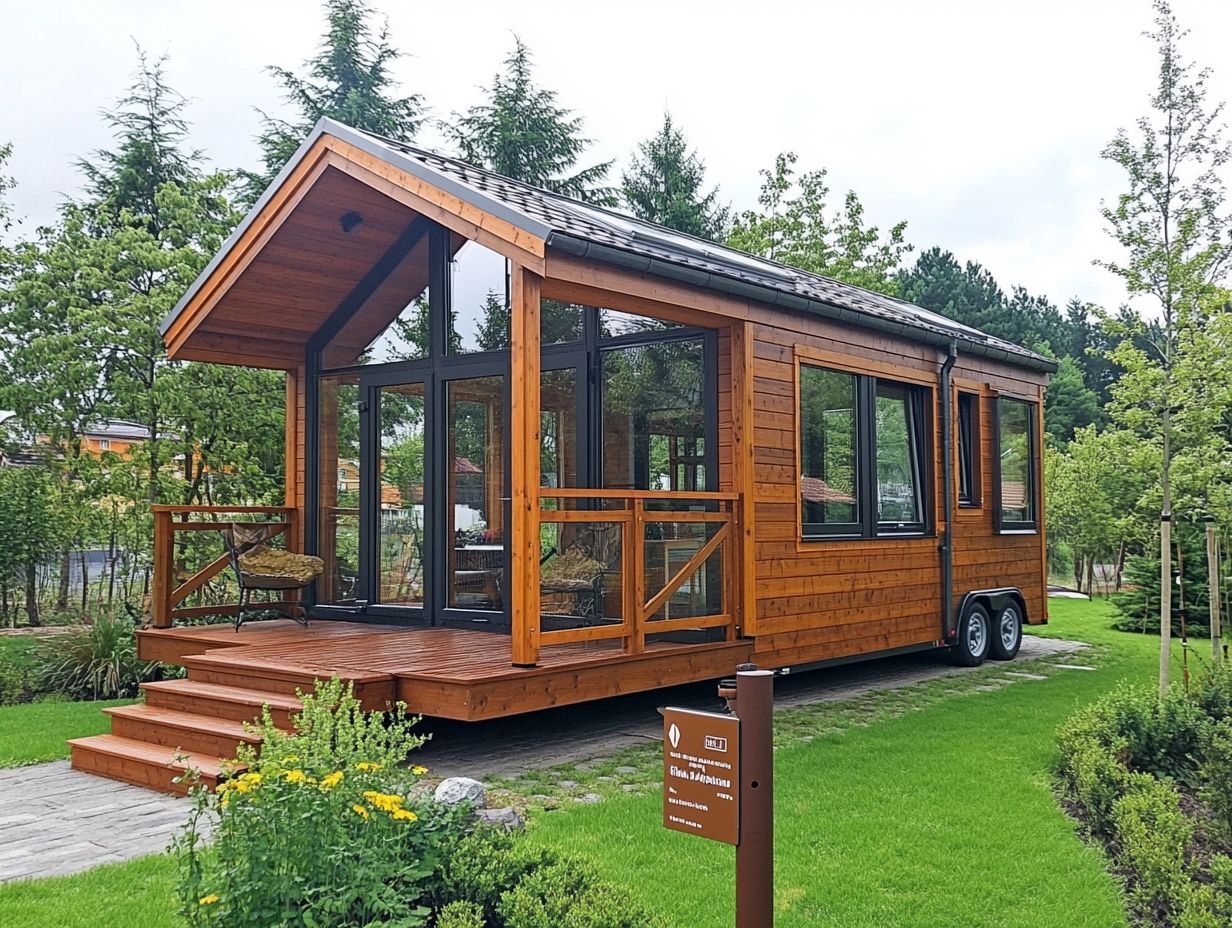
What are the main laws that every owner of a tiny house should know?
The main laws that every owner should know include zoning laws, building codes, and minimum size requirements for a dwelling. It’s important to research and understand these laws before building or purchasing a tiny house.
What is a zoning law and how does it affect tiny house owners?
Zoning laws are regulations set by local governments that dictate how land can be used. These laws can restrict where a tiny house can be parked or built. It’s important to check with your local zoning department before moving or building a tiny house.
Do tiny houses have to adhere to building codes?
Yes, most areas require tiny houses to adhere to building codes just like traditional homes. These codes ensure the safety and structural integrity of the house and may vary depending on the location.
Are there any minimum size requirements for a tiny house to be considered a legal dwelling?
Yes, some areas have minimum size requirements for dwellings, which may make it difficult for a tiny house to be considered a legal dwelling. It’s important to check with your local government to see what the requirements are in your area.
Can I park my tiny house on any property?
No, you cannot park your tiny house on any property without permission. It’s important to obtain written permission from the property owner before parking your tiny house on their land. Violating this rule may result in fines or legal action.
Are there any special permits or licenses required for owning a tiny house?
It’s important to check with your local government to see if there are any specific permits or licenses required for owning a tiny house. Some areas may require a special permit for a tiny house to be used as a permanent residence.

